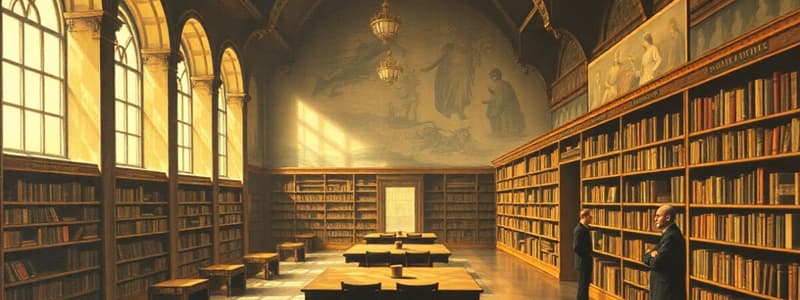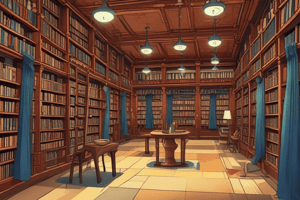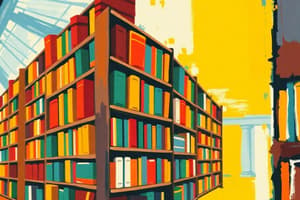Podcast
Questions and Answers
Which of the following statements best describes the primary function of a public library?
Which of the following statements best describes the primary function of a public library?
- To function as a 'people's university,' providing free educational and social services to all members of the community. (correct)
- To operate as a commercial enterprise, offering information services and resources primarily to local industries for a fee.
- To primarily cater to the academic needs of university students and faculty through specialized research collections.
- To serve as a repository for rare and historical manuscripts, accessible only to accredited researchers.
National libraries primarily focus on serving the local interests and commerce of their immediate community.
National libraries primarily focus on serving the local interests and commerce of their immediate community.
False (B)
Besides books, periodicals, newspapers, and magazines, what type of materials do public libraries provide to support literacy programs?
Besides books, periodicals, newspapers, and magazines, what type of materials do public libraries provide to support literacy programs?
Non-book materials
Libraries that are movable and serve people in villages where there are no libraries are called ______ services.
Libraries that are movable and serve people in villages where there are no libraries are called ______ services.
Match the following libraries with their country:
Match the following libraries with their country:
Which innovation was most crucial in enabling the Sumerians to preserve their records for future generations?
Which innovation was most crucial in enabling the Sumerians to preserve their records for future generations?
King Assurbanipal's library at Nineveh primarily housed records inscribed on papyrus scrolls.
King Assurbanipal's library at Nineveh primarily housed records inscribed on papyrus scrolls.
What term is used to describe the writing system developed and used by the Sumerians on clay tablets?
What term is used to describe the writing system developed and used by the Sumerians on clay tablets?
The Sumerians utilized ______ as writing materials, which were then dried and baked to preserve records.
The Sumerians utilized ______ as writing materials, which were then dried and baked to preserve records.
Match each ancient civilization with their contribution to library development:
Match each ancient civilization with their contribution to library development:
Which service involves tailoring information delivery to users based on their specific needs and profiles?
Which service involves tailoring information delivery to users based on their specific needs and profiles?
Special libraries primarily offer services aimed at the general public, rather than focusing on specialized information needs.
Special libraries primarily offer services aimed at the general public, rather than focusing on specialized information needs.
What type of library is typically attached to organizations such as the Nigerian Bar Association (NBA) or the Institute of Chartered Accountants of Nigeria (ICAN)?
What type of library is typically attached to organizations such as the Nigerian Bar Association (NBA) or the Institute of Chartered Accountants of Nigeria (ICAN)?
The IITA Library and Documentation Centre in Ibadan is an example of a ______ library in Nigeria.
The IITA Library and Documentation Centre in Ibadan is an example of a ______ library in Nigeria.
Match each library type with its primary organizational context:
Match each library type with its primary organizational context:
Which of the following best describes the relationship between a law library and a lawyer, based on the provided information?
Which of the following best describes the relationship between a law library and a lawyer, based on the provided information?
Access to a law library is unrestricted, allowing anyone to utilize its resources.
Access to a law library is unrestricted, allowing anyone to utilize its resources.
Besides legal professionals, name two other professions that, according to the text, may require access to legal collections in law libraries.
Besides legal professionals, name two other professions that, according to the text, may require access to legal collections in law libraries.
Well-researched judgments, rulings, and decisions of courts are made with the consultation of legal collections in the _______ libraries.
Well-researched judgments, rulings, and decisions of courts are made with the consultation of legal collections in the _______ libraries.
Match the library type with an example of an institution that would have such a library.
Match the library type with an example of an institution that would have such a library.
Which legislative action most directly addressed and resolved the initial shortcomings in the National Library of Nigeria's ability to fully act as a legal depository?
Which legislative action most directly addressed and resolved the initial shortcomings in the National Library of Nigeria's ability to fully act as a legal depository?
The National Library of Nigeria is exclusively responsible for documenting publications by Nigerian authors, regardless of where these works are published.
The National Library of Nigeria is exclusively responsible for documenting publications by Nigerian authors, regardless of where these works are published.
Besides collecting and preserving national publications, what is a key function of the National Library of Nigeria related to national documentation?
Besides collecting and preserving national publications, what is a key function of the National Library of Nigeria related to national documentation?
The National Library of Nigeria plays a crucial role in intellectual property by administering the __________ Centre and __________ Agency.
The National Library of Nigeria plays a crucial role in intellectual property by administering the __________ Centre and __________ Agency.
Match each function to the appropriate body responsible for its execution in Nigeria:
Match each function to the appropriate body responsible for its execution in Nigeria:
Which activity falls OUTSIDE the direct responsibilities of the National Library of Nigeria, despite supporting library development?
Which activity falls OUTSIDE the direct responsibilities of the National Library of Nigeria, despite supporting library development?
The National Library of Nigeria's sole focus is on archiving and preserving national publications, with no involvement in providing ISBNs or ISSNs.
The National Library of Nigeria's sole focus is on archiving and preserving national publications, with no involvement in providing ISBNs or ISSNs.
Besides archiving national publications, what is another key function performed by the National Library of a country that directly contributes to the organization and accessibility of information resources?
Besides archiving national publications, what is another key function performed by the National Library of a country that directly contributes to the organization and accessibility of information resources?
The National Library of Nigeria disseminates knowledge and supports library development through organizing conferences, seminars, and ______ for library professionals.
The National Library of Nigeria disseminates knowledge and supports library development through organizing conferences, seminars, and ______ for library professionals.
Match the following departments within a National Library with their primary function:
Match the following departments within a National Library with their primary function:
Which of the following is the MOST accurate description of the primary goal of special libraries?
Which of the following is the MOST accurate description of the primary goal of special libraries?
Special libraries, unlike general libraries, typically offer unrestricted access to the public and community members.
Special libraries, unlike general libraries, typically offer unrestricted access to the public and community members.
Special libraries are also known as ________ libraries.
Special libraries are also known as ________ libraries.
A key role of special libraries is to promote ________ within their specialized field by providing access to current research and resources.
A key role of special libraries is to promote ________ within their specialized field by providing access to current research and resources.
Match the following types of special libraries with their corresponding examples:
Match the following types of special libraries with their corresponding examples:
Which of the following best describes how a special library supports its parent organization?
Which of the following best describes how a special library supports its parent organization?
In an academic setting, special libraries operate entirely independently from the central library.
In an academic setting, special libraries operate entirely independently from the central library.
What distinguishes special Libraries from General Libraries?
What distinguishes special Libraries from General Libraries?
Which practice was commonly employed in monastic libraries to safeguard manuscripts?
Which practice was commonly employed in monastic libraries to safeguard manuscripts?
Cathedral libraries were established primarily to serve the general public's reading needs during the era of cathedral construction.
Cathedral libraries were established primarily to serve the general public's reading needs during the era of cathedral construction.
What specific role did the 'scriptorium' play within monastic libraries?
What specific role did the 'scriptorium' play within monastic libraries?
The invention of the printing press by Johannes Gutenberg in the 15th century led to a decrease in the value of handwritten ______.
The invention of the printing press by Johannes Gutenberg in the 15th century led to a decrease in the value of handwritten ______.
Which factor was most influential in the development of university libraries during the 13th century?
Which factor was most influential in the development of university libraries during the 13th century?
Which of the following best describes the primary method Romans used to build their library collections?
Which of the following best describes the primary method Romans used to build their library collections?
Monasteries discouraged the development of libraries during medieval times.
Monasteries discouraged the development of libraries during medieval times.
Monastic libraries primarily focused on preserving secular writings, largely neglecting religious texts.
Monastic libraries primarily focused on preserving secular writings, largely neglecting religious texts.
What material did Egyptians primarily use for writing, sourced from the Nile River?
What material did Egyptians primarily use for writing, sourced from the Nile River?
Match the following types of libraries with their primary purpose or characteristic:
Match the following types of libraries with their primary purpose or characteristic:
During the medieval period, the copying of ancient manuscripts in monasteries was known as _______.
During the medieval period, the copying of ancient manuscripts in monasteries was known as _______.
During the fall of Rome, which institutions became the primary centers of learning and preservation of knowledge?
During the fall of Rome, which institutions became the primary centers of learning and preservation of knowledge?
Match the type of library with its primary role during the medieval period:
Match the type of library with its primary role during the medieval period:
Which of the following factors significantly spurred the invention of hieroglyphics in ancient Egypt?
Which of the following factors significantly spurred the invention of hieroglyphics in ancient Egypt?
The establishment of private libraries in Rome was solely motivated by a desire to promote literacy among the lower classes.
The establishment of private libraries in Rome was solely motivated by a desire to promote literacy among the lower classes.
Which invention in the 15th century significantly impacted the development of libraries, facilitating the wider distribution of knowledge?
Which invention in the 15th century significantly impacted the development of libraries, facilitating the wider distribution of knowledge?
What was the primary initial contribution of the Carnegie Corporation to library development in Nigeria?
What was the primary initial contribution of the Carnegie Corporation to library development in Nigeria?
The University College, Ibadan, established in 1948, was initially mandated to be the sole national depository for all Nigerian publications, a function it retains to this day.
The University College, Ibadan, established in 1948, was initially mandated to be the sole national depository for all Nigerian publications, a function it retains to this day.
What pivotal role was assigned to the University College, Ibadan library upon its establishment in 1948 concerning Nigerian publications?
What pivotal role was assigned to the University College, Ibadan library upon its establishment in 1948 concerning Nigerian publications?
Before the establishment of the National Library of Nigeria, the University College, Ibadan library served as the national ______ for Nigerian publications.
Before the establishment of the National Library of Nigeria, the University College, Ibadan library served as the national ______ for Nigerian publications.
Which legislative action officially designated the National Library of Nigeria to collect and preserve national documents?
Which legislative action officially designated the National Library of Nigeria to collect and preserve national documents?
Match the library types with their primary focus:
Match the library types with their primary focus:
Which of the following is NOT a statutory duty of the National Library of Nigeria?
Which of the following is NOT a statutory duty of the National Library of Nigeria?
What motivated the establishment of various library types in Nigeria?
What motivated the establishment of various library types in Nigeria?
Flashcards
National Library Key Activities
National Library Key Activities
Assigns ISSNs, ISBNs and maintains National Union Catalogues.
ISBN Publishers Directory
ISBN Publishers Directory
A publication listing Nigerian publishers using ISBNs.
National Bibliography of Nigeria (NBN)
National Bibliography of Nigeria (NBN)
A comprehensive record of publications produced in Nigeria.
Public Library
Public Library
Signup and view all the flashcards
Public Library Purpose
Public Library Purpose
Signup and view all the flashcards
Niger Biblios
Niger Biblios
Signup and view all the flashcards
National Library
National Library
Signup and view all the flashcards
People's University
People's University
Signup and view all the flashcards
Book Mobile Services
Book Mobile Services
Signup and view all the flashcards
Business/Industrial Libraries
Business/Industrial Libraries
Signup and view all the flashcards
Academic Law Libraries
Academic Law Libraries
Signup and view all the flashcards
Law Library
Law Library
Signup and view all the flashcards
Other Special Libraries
Other Special Libraries
Signup and view all the flashcards
Importance of Legal Collections
Importance of Legal Collections
Signup and view all the flashcards
What are Special Libraries?
What are Special Libraries?
Signup and view all the flashcards
Current Awareness Services
Current Awareness Services
Signup and view all the flashcards
Selective Dissemination of Information (SDI)
Selective Dissemination of Information (SDI)
Signup and view all the flashcards
Indexing and Abstracting Services
Indexing and Abstracting Services
Signup and view all the flashcards
Special Library Types in Nigeria
Special Library Types in Nigeria
Signup and view all the flashcards
Why Study Library History?
Why Study Library History?
Signup and view all the flashcards
Early Library Materials
Early Library Materials
Signup and view all the flashcards
Sumerians & Libraries
Sumerians & Libraries
Signup and view all the flashcards
Cuneiform
Cuneiform
Signup and view all the flashcards
King Assurbanipal
King Assurbanipal
Signup and view all the flashcards
National Library Duties
National Library Duties
Signup and view all the flashcards
National Library Decree of 1970
National Library Decree of 1970
Signup and view all the flashcards
National Library Focus
National Library Focus
Signup and view all the flashcards
National Library: ISSN/ISBN Role
National Library: ISSN/ISBN Role
Signup and view all the flashcards
Ancient Greek Libraries
Ancient Greek Libraries
Signup and view all the flashcards
Egyptian Libraries
Egyptian Libraries
Signup and view all the flashcards
Roman Libraries
Roman Libraries
Signup and view all the flashcards
Monastic Libraries
Monastic Libraries
Signup and view all the flashcards
Cathedral Libraries
Cathedral Libraries
Signup and view all the flashcards
University Libraries (13th Century)
University Libraries (13th Century)
Signup and view all the flashcards
Renaissance Library Change
Renaissance Library Change
Signup and view all the flashcards
Egyptian Hieroglyphics
Egyptian Hieroglyphics
Signup and view all the flashcards
Libraries & Imagination
Libraries & Imagination
Signup and view all the flashcards
Accessible Library Sections
Accessible Library Sections
Signup and view all the flashcards
Cultural Preservation in Libraries
Cultural Preservation in Libraries
Signup and view all the flashcards
Library as Info Center
Library as Info Center
Signup and view all the flashcards
Library Education Role
Library Education Role
Signup and view all the flashcards
Library Events
Library Events
Signup and view all the flashcards
Special Libraries
Special Libraries
Signup and view all the flashcards
Special Libraries Aim
Special Libraries Aim
Signup and view all the flashcards
Scriptorium
Scriptorium
Signup and view all the flashcards
University Libraries
University Libraries
Signup and view all the flashcards
University Growth & Libraries
University Growth & Libraries
Signup and view all the flashcards
Renaissance Era
Renaissance Era
Signup and view all the flashcards
Johannes Gutenberg
Johannes Gutenberg
Signup and view all the flashcards
Printing Press
Printing Press
Signup and view all the flashcards
Early Nigerian Libraries
Early Nigerian Libraries
Signup and view all the flashcards
Lagos Book Club
Lagos Book Club
Signup and view all the flashcards
Carnegie Corporation
Carnegie Corporation
Signup and view all the flashcards
British Council Library
British Council Library
Signup and view all the flashcards
Ibadan University Library
Ibadan University Library
Signup and view all the flashcards
Legal Deposit
Legal Deposit
Signup and view all the flashcards
Public Libraries
Public Libraries
Signup and view all the flashcards
School Libraries
School Libraries
Signup and view all the flashcards
Study Notes
Ancient Times
- Libraries' origins trace back to early civilizations like Egypt, Sumer, Greece, and Rome.
- Early libraries consisted of royal, church and commercial records written on papyrus scrolls and clay/stone tablets.
- Ancient Mesopotamia's rich civilization and culture significantly contributed to library development due to agricultural and business activities.
Sumerians
- The Sumerians preserved records by developing clay tablets in organized locations for future generations.
- Wet clay tablets with reed pens were dried and baked with the writing called CUNEIFORM.
- Cuneiform allowed recording business transactions, receipts, private letters, laws, and religion.
- King Assurbanipal (669-626 BC) of Nineveh had a notable library in Mesopotamia with many clay tablets.
- Sumerians established first government, private and religious libraries, which served as record rooms and archives.
Greece
- The Greeks were known for literature and scholarship; their traders supplied papyrus/parchment for copying.
- Extensive learning and record keeping in Greece led to numerous private and public libraries.
- Prominent philosophers like Socrates, Aristotle, and Plato were first to establish public libraries.
- Ancient Greek temple libraries housed collections on various subjects.
Egyptians
- Egyptians valued their writings; they needed to record business activities for their civilization.
- They used hieroglyphics for writing in pictorial form to record religious ceremonies, prayers, and business matters.
- Papyrus was used as writing material from the Nile's fertile land for recording important events kept in temples and palaces.
- Archaeological excavations revealed scrolls that the Egyptians kept in temple libraries for posterity.
Romans
- Romans accumulated collections through spoils of war.
- Julius Caesar proposed public libraries, but prominent citizens of Rome primarily established private libraries.
Medieval Times
- The three main libraries in Europe's historical development were Monastic, Cathedral, and University libraries.
Monastic Libraries
- Monasteries were learning centers where reading was encouraged as part of spiritual life.
- In this era, education moved to monasteries, contributing to library development.
- Monks meticulously copied Christian and secular writings, preserving many ancient manuscripts not seen in secular institutions.
- "Scriptorium" was where monks extensively copied Bibles and religious works under strict rules.
Cathedral libraries
- Great cathedrals and educational entities simultaneously trained priests and government officials.
- Subjects like Latin, classics, grammar, and literature were taught.
University libraries
- Many European universities were established in the 13th century
- Research, knowledge and students’ needs catalyzed universities with better libraries.
- With university growth, so did the need to preserve classical literature and other works.
Renaissance Era
- Libraries experienced development due to Johannes Gutenberg's invention of the printing machine in the 15th Century.
- The printing press enabled mass production and impression of a capability to run several copies.
History of Libraries in Nigeria
- Nigerian library origins can be traced to archives and book collection centers.
- The Lagos Book Club was established as a public library in the late 1920s led by Sir Allan Burns in 1929.
- Carnegie Corporation of New York gave a generous grant which assisted in establishing a library in Nigeria in 1932.
- The British Council came to Nigeria in 1943and established library branches.
- The University College, Ibadan established the first University library in Nigeria in 1948.
- A Nigerian depositary for publications was mandated by the Publications and Ordinance Act of 1950.
National Libraries/National Library of Nigeria
- The National Library is the highest-level library funded by the government and a depository of knowledge.
- National Library of Nigeria was established by the National Library Act of 1964 and maintained by the government.
- The National Library in Nigeria serves as a depository to that nation, collecting and preserving key publications.
- The lacuna in the 1964 Act was corrected by the National Library Decree of 1970.
- In other words, the law empowers the National Library to receive copies of published materials.
- The documents stored strengthen Nigeria's information assets.
National Library Statutory Duties
- Collecting and preserving national publications (books, periodicals, newspapers, print/non-print documents).
- Publishing national bibliographies.
- Maintaining the National Bibliographic Information Centre.
- Collecting Nigerian intellectual output through legal deposit.
- Producing the National Bibliography of Nigeria(NBN).
- Administering International Standard Serial Number(ISSN) Centre and International Standard Book Number (ISBN) Agency.
National Library Departments
- Collection Development and Processing Department (CDPD)
- National Bibliographic Control Department (NBCD)
- National Information and Documentation Centre (NIDOC)
- Planning Research and Statistics Development (PRSD)
- Finance and Supplies Department (FSD)
- Personnel Management Department (PMD)
- Readers Services Department (RSD)
National Library Publications
- ISBN Publishers Directory
- National Bibliography of Nigeria (NBN)
- Nominal list of Practicing Librarians in Nigeria
- ISBN User's Manual
- ISBN Brochure
- Nigerian file of International Standard Serial Number
- Directory of Libraries in Nigeria
- National Library of Nigeria Occasional papers
- National Union List of Serials (NULOS)
- National Digest of Library Statistics in Nigeria
Public Libraries
- The term "public library" signifies that public libraries should serve the community they are located in.
- Public libraries are managed by state/local authorities.
- They serve as a 'people's university' and offer knowledge to the public.
- Collections accommodate specific interests; info is provided for local industries/commerce aiding development.
- Public libraries supply free education/social services such as books, periodicals and literacy programs to serve the public.
- Bookmobile services are movable libraries provided to the people to serve in villages
- Mobile libraries use trucks with an open space at the back; they move from one village to another.
Types Of Libraries
- Libraries are categorized by the nature of parental entity, collections, clientele, services to users and functions.
- Types of libraries are generally used for Reading, Reference, Research and Recreation.
Special Libraries
- Special libraries have specialized collections catering to a specific group, delivering dedicated services.
- Designed to offer up to date information services to promote professionalism.
- A law library is an example of special libraries that are distinct from academic environments.
- The special library acquires special collections related to the organization it supports with multi-disciplinary subjects.
- Access to these libraries is generally restricted to specific certified groups or community members, differing from public libraries.
Special Libraries: Services
- Internet Connectivity and Regular Access
- Noter-up service
- Comprehensive literature search
- Current Awareness Services
- Compilation of Comprehensive Reading List
- Indexing and Abstracting Services
- Private collection of Prominent Individuals in the Profession
- Publishing Accession Lists
- Newspaper Cuttings
- Issues Newsletters
- Provide Research Reports
- Reference Services
- Selective Dissemination of Information (SDI)
- Specialized Research Services
- Promote professionalism in the particular field of learning
- Collection of Government Report
Special Libraries Examples In Nigeria
- Research Libraries
- Government Departmental Libraries
- Professional Libraries (Attached to Professional Bodies)
- Business and Industrial Libraries (Attached to Industries and Banks)
- Academic Law Libraries
- Other Special Libraries (Medical, Hospital, Engineering, Museum and Military)
Studying That Suits You
Use AI to generate personalized quizzes and flashcards to suit your learning preferences.



